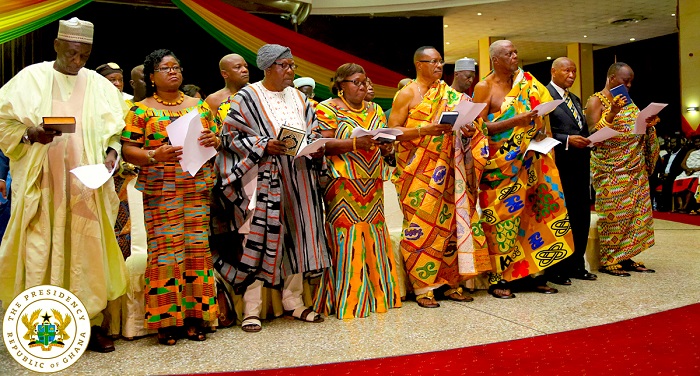Members of the Council of State Monday held a closed-door meeting with President Nana Addo Dankwa Akufo-Addo on the high rate of duties, levies and taxes on imported goods at Ghana’s ports of entry and the large volumes of tax exemptions.
Some traders unions, including the Ghana Union of Traders Associations (GUTA), have petitioned the state to intervene to review taxes and duties on imported items because they are too high.
Following the petition, the Council of State moved into action to hold consultations with various stakeholders to enable it to provide informed advice on the issue.
The council held discussions with a number of stakeholders, including the Minister of Trade and Industry, Mr Alan Kyerematen, and the Commissioner of the Customs Division of the Ghana Revenue Authority (GRA), Mr Isaac Crentsil.
The council also met the Minister of Finance, Mr Ken Ofori-Atta, and the leadership of GUTA, bringing the month-long consultative exercise to an end.
Addressing the opening session of the meeting between the Council of State and the President, which later went into a closed-door session, at the Jubilee House, in Accra, the Chairman of the council, Nana Otuo Siriboe II, said the council would discuss its findings,
conclusions and recommendations with the President.
President on Taxes
In his State of the Nation Address (SONA) to Parliament last February, President Akufo-Addo said revenue mobilisation posed the biggest challenge to the management of the economy, with the tax exemption policy, in particular, proving to be an Achilles’ heel.
In the last eight years, he said, tax exemptions in respect of import duty, import VAT, import NHIL and domestic VAT had grown from GH¢392 million, representing 0.6 per cent of GDP in 2010, to GH¢4.66 billion, constituting 1.6 per cent of GDP in 2018.
“If we continue at this rate, in less than 16 years half of Ghana’s revenue base will be given away as tax exemptions,” he said.
Chairman
Nana Siriboe described as historic the achievements of President Akufo-Addo’s government “in fulfilment of the electoral promises he made in 2016”.
Those achievements, he said, included the reopening of the Obuasi Mine, the restoration of peace in Dagbon and the installation of a new Yaa Naa and the creation and inauguration of six new regions and the appointment of regional and deputy regional ministers for those regions.
Past Year
Nana Siriboe said the council issued its report last year covering its activities during its first year in office.
Since then, he said, it had held 57 meetings in both plenary and sub-committee sessions and would soon issue its second report.
He explained that during those sessions, the council considered important appointments, met with various institutions and personalities, received petitions and deliberated on them and considered appointments to boards, councils, authorities and committees.
Additionally, he said, it examined and reported on some very important appointments to positions such as Chairman of the Electoral Commission (EC) and two deputies and four Supreme Court judges.
The council also met with the Lands Commission, the Inter-Ministerial Committee on lllegal Mining (IMCIM), the Speaker and the leadership of Parliament, the Governor of the Bank of Ghana (BOG), the National Petroleum Authority, the Minister of Education and the Chief Executive and senior management of the Ghana Cocoa Board (COCOBOD).
Source: Daily Graphic


